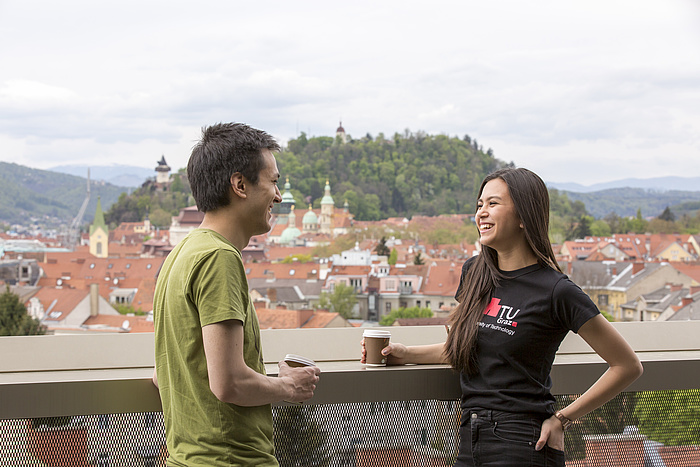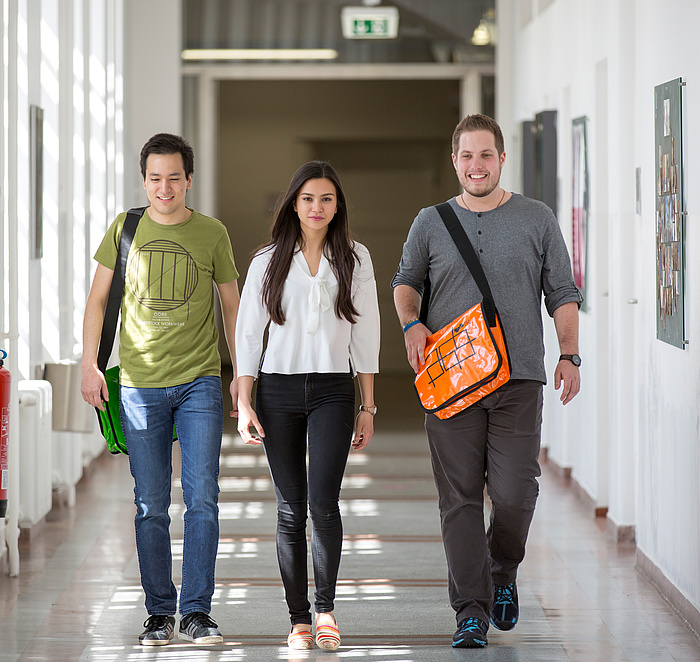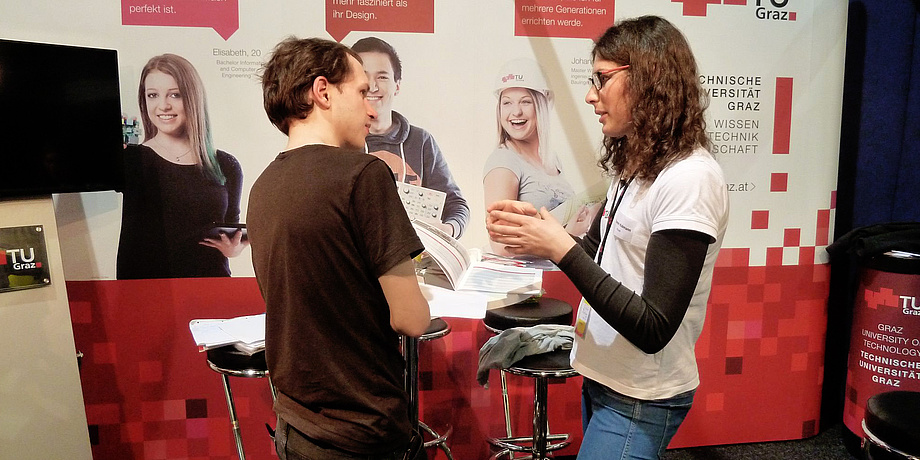From the view of a team of advisors at the TU Graz fair stand, a day at the fair can be exciting and even quite challenging when we have to answer detailed questions on particular fields of study. Here is a selection of the most frequently asked questions which we’ve compiled for you.
What study programmes are offered at TU Graz?
Science and engineering programmes from Architecture to Mechanical Engineering and Business Economics. You can find more details about the individual study programmes at TU Graz here.
Are there any bachelor’s programmes in English?
The range of study programmes at TU Graz comprises a large number of master’s programmes in English but no bachelor’s programmes in English. This will stay the same in the future.
Can I get any help when starting my studies?
Many new students are unclear about the daily routine at uni and bewildered by the torrent of unfamiliar abbreviations, such as VO, VU, UE, SE, LU or ECTS.. Have no fear! Explanations are given about the uni abbreviations jungle and the online system, and many other questions are answered each year at the Welcome Days at the beginning of studies.
As a woman can I study in an engineering field?
Yes, you can – especially because you’re a woman! Women are no way any worse in science and engineering study programmes. What’s important is your interest and whether you have fun doing it. The Women in Technology (FIT) project has a broad range of activities for girl pupils interested in science and engineering, from school visits and information days to placements and internships.
What opportunities are there on the job market for women?
Exactly the same as for men. Women in engineering professions are much sought after – brilliant career prospects await you.
How high is the share of women at TU Graz?
28 per cent of all TU Graz first semester students in 2016/17 were women. Altogether, the share of women at the University was about 23 per cent, and 26 per cent of all graduates of TU Graz were women. You can view the current statistics about the share of women at TU Graz in the Campus Management System.
What are the career prospects like in general?
Again, extremely good. Engineers and scientists are much sought after in most fields, and many graduates of TU Graz do not have to wait long looking for their dream job – which often comes knocking at their door.
What are the advantages of Graz as a study location?
So you’ve discovered your dream study programme but you don’t know where to pursue it? There’s a lot to be said for the Styrian provincial capital. Graz is the second biggest city in Austria but still offers a family-like environment for your studies. TU Graz with its approximately 13,000 students (16,500 in 2020) is regarded as a rather small university but has an outstanding ratio of teaching staff to students. And why wouldn’t you want to study in the coolest student town of Austria? You can find all sorts of information about the sights, lifestyle, cuisine and lots of photos on the Graz tourism website.

What to study and where? There’s a lot to be said for Graz. The second biggest city in Austria has about 280,000 inhabitants, four universities, lots of green areas and an easygoing flair.
What are the admission criteria?
There are special admission procedures in bachelor’s programmes in Architecture, Molecular Biology, Electrical Engineering and Audio Engineering and in the bachelor’s programme in Teacher Training for Secondary Education (teaching subjects descriptive geometry and computer science). What exactly is the admission procedure?
- Architecture: The first step is to write a letter of motivation. Then you have to do a written admission test. You can find more details about the admission test for the bachelor’s programme in Architecture here.
- Molecular Biology: The first step is to complete an online self-assessment. This will tell you how suitable you are for this study programme. Then there is a written admission test. You can find more details about the admission for the bachelor’s programme in Molecular Biology on the following link.
- Electrical Engineering and Audio Engineering: You register for the Electrical Engineering and Audio Engineering study programme at TU Graz and then take the admission exam at the University of Music and Performing Arts (KUG). You can find out all the things you need to know about the admission exam for Electrical Engineering and Audio Engineering here.
- Teacher Training for Secundary Education (teaching subjects descriptive geometry and computer science). You register and then complete the online self-assessment. Switch to the Registration portal for the Teacher Training for General Secondary Education.
Are there a limited number of places in each study programme?
The number of places is not limited for all the bachelor’s programmes except for Architecture, Molecular Biology, and Electrical Engineering and Audio Engineering.
What are the admission criteria for international students?
Students from the EU and other international students have to apply for a university place. Follow this link for information about admission criteria for international students.

TU Graz trains students for international careers with the help of English-language master’s programmes. The range of courses draws both national and international students. For those who did not get their bachelor’s degree at Graz University of Technology or NAWI Graz, there is a special admission procedure.
What are the admission criteria for master’s programmes?
If your bachelor’s programme matches the bachelor’s programme at TU Graz to a certain extent, you can follow it up with a master’s programme. What conditions you have to fulfill is decided by the dean of studies. There is no special admission procedure for master’s programmes held in English if you have completed a suitable bachelor’s programme at TU Graz or NAWI Graz. You can find all the information about admission to degree programmes at TU Graz here.
How many first semester students are there at TU Graz?
You can view the statistics about first semester students from all the fields of study here.
In Graz there is also the NAWI Graz programme: what exactly is it?
The NAWI Graz programme is a cooperation between TU Graz and the University of Graz. It makes use of the joint resources of both universities. Students attend courses at both universities. It doesn’t matter which university you enroll at.
What is the difference between Mathematics/ Chemistry/ Physics at the University of Graz and TU Graz?
Since these studies take place in the framework of NAWI Graz, there is no difference.
Are there any part-time study programmes at TU Graz?
We’re often asked if TU Graz offers part-time courses or whether it is principally possible to work a few hours parallel to studying. It is in principle possible but not recommended in the first year of a bachelor’s programme because there are so many exercise and lab practicals with compulsory attendance and an appropriate amount of preparation and follow-up.
Can you go abroad in the framework of your studies?
International activities are becoming increasingly important, and for this reason a stay abroad in the context of your study programme is a wonderful opportunity to get to know other countries and cultures. There are a variety of programmes, such as Erasmus or Joint Study. You can find information about studying abroad on the TU Graz website.
Is studying at TU Graz subject to a charge?
Students from the EU only have to pay the Students’ Union fee. Students from third countries are not exempt from tuition fees. You can find lots of information about tuition fees, benefits and grants here.
